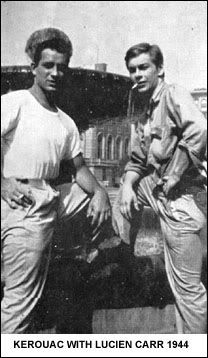Sometimes people ask me, “What makes the Beats so special? They were just a bunch of writers."
You know what? Usually I don’t even answer and I don’t care what anyone thinks about what I like and don’t like.
1950's teletype machine
 1959 Austin Healey
1959 Austin HealeyPart of it goes like this: I appreciate Thoreau (a lot!) but I never lived in a cabin. I recognize greatness around the globe: Dickens, Dostoevsky, Basho, Nietzsche, but none of them watched Steve Allen or the Three Stooges on black & white TV, or push-started a car, or used wire transmissions to automatically set type, like reporters for United Press could do starting in 1951. That was the year the first teletypestter was introduced.
Now Lucien Carr was not only a reporter with the United Press. He is also the man who introduced Allen Ginsberg, William S. Burroughs, and Jack Kerouac to each other. He most likely is the one who gave Kerouac the legendary roll of teletype paper on which wrote one non-stop version of On the Road. I know some people say it was a roll of wall paper, but I saw a clip of Jack on the Steve Allen Show, and Jack said it was teletype paper. For all I know, he could have written on all variety of rolled up materials. But again, I don’t care.
I care that when I see that famous picture of Kerouac and Carr, standing side-by-side, athletic Jack in his white T-shirt wavy-haired Lucien with one foot propped up in a jaunty pose, cigarette dangling from his mouth, he reminds me of my cousin Harry King. When I was 12 years old and Harry was 19, he had a little Austin Healey sports car and he showed me how to gap spark plugs using a matchbook cover.
“It’s just the right thickness,” Harry told me. After gapping the plugs, cigarette dangling from his mouth, Harry would pour water in the car battery from a rinsed out glass coke bottle. That’s what you used. “Perfect thing for it,” he said.
Harry was hip. Within a couple of years he was in the Army and stationed in Viet Nam. He came back not quite as free-wheeling and eventually went to work selling plastic parts for cars back before cars had all the plastic in them that they do today. It was a forward looking company.
To anyone who thinks Lucien Carr should have stayed “Beat” and not gone to work for the “establishment” United Press, Cousin Harry would have said, “ Well, maybe he digs the new media like I dig new cars.”
What I want to say to the family and friends of Lucien Carr is, I can relate to your loss, the way I feel the loss of my cousin Harry.

 [/img]
[/img]